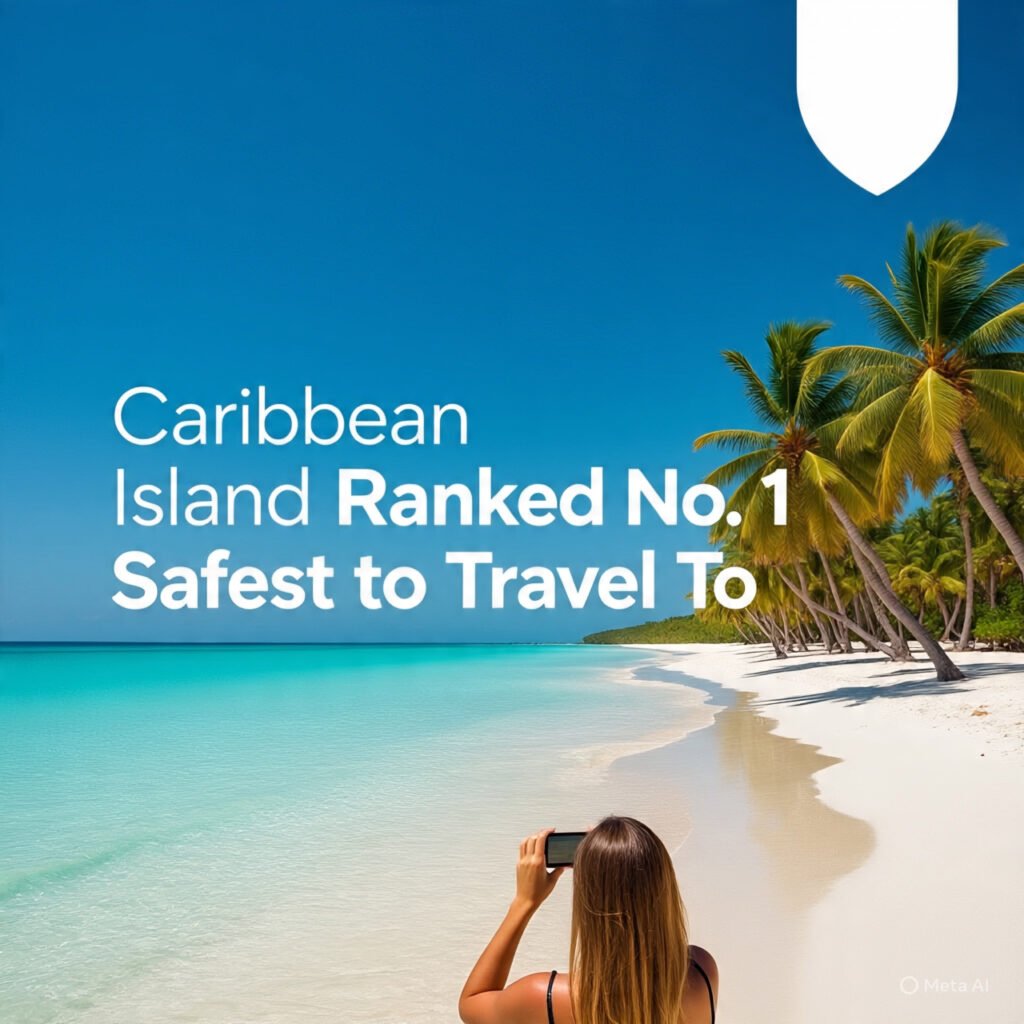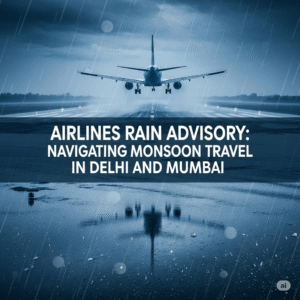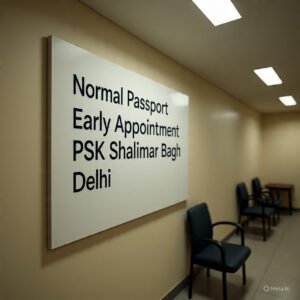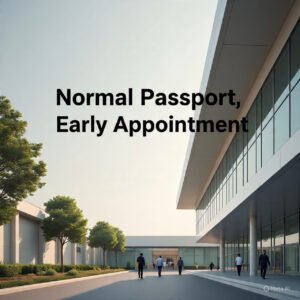For millions of global travelers, the dream of a Caribbean getaway is often tempered by practical concerns about travel safety and natural disasters. While the region boasts some of the world’s most beautiful destinations, crime rates and exposure to the annual hurricane season can vary significantly from one island to the next. In a major and highly anticipated analysis, the recently released Caribbean Island Safety Index 2025 has provided clarity, naming the Dutch Caribbean island of Aruba as the undisputed No. 1, officially establishing it as the safest Caribbean Island for travelers.11 This top ranking is a testament to its remarkably low crime rate, stable political environment, and unique geographical positioning outside of the major hurricane belt.
This professional and detailed article delves into the methodology behind the new ranking, explores the unique factors that contribute to Aruba’s exceptional travel safety profile, and compares it with other popular Caribbean destinations, providing essential information for anyone planning a worry-free Caribbean vacation.
Table of Contents
The Methodology: Defining Travel Safety in the Caribbean
Historically, rankings of the “safest Caribbean Island” were often based solely on crime data, primarily homicide rates. The new Caribbean Island Safety Index 2025 adopts a more comprehensive and holistic approach, factoring in multiple variables that directly impact a traveler’s overall sense of security and well-being.12
The Index evaluated ten popular Caribbean destinations across four weighted categories:13
- Crime and Tourist Safety Score (30%): Based on official local crime statistics and tourist-specific incident reports.14
- US Department of State Travel Advisories (30%): The official US Department of State Travel Advisory Level (1–4) for each country, which assesses various risks, including crime and civil unrest.15
- Hurricane Frequency (20%): Data from the National Oceanic and Atmospheric Administration (NOAA) on the historical frequency of severe storms impacting the island.
- Healthcare Access (20%): Evaluation of the quality of public and private healthcare facilities, access to emergency services, and general health infrastructure.
Aruba achieved a near-perfect composite score of 9.3 out of 10, significantly outperforming other popular destinations.16 Its top marks across the Crime and Travel Advisory categories, coupled with a perfect score for hurricane-free status, sealed its position.17
Aruba’s Unrivaled Low Crime Rate and Security Profile
The centerpiece of Aruba’s safety ranking is its consistently low crime rate.18 While petty theft, such as purse snatching or car break-ins, can occur in any tourist destination, Aruba has one of the lowest rates of violent crime in the entire Caribbean.19
Factors Contributing to Aruba Travel Safety
Aruba, known locally as “One Happy Island,” is a constituent country of the Kingdom of the Netherlands, which contributes to its robust stability and high standards of living.20
- Community-Focused Policing: The Aruban Police Force maintains a highly visible and proactive presence, particularly in the major tourist zones like Palm Beach and Eagle Beach.21 The island’s size facilitates rapid response times and close cooperation between law enforcement and the tourism industry.
- Economic Stability: Aruba boasts a relatively high standard of living and a strong, stable economy largely fueled by the tourism sector. A healthy economy reduces the incentives for opportunistic crime targeting visitors.
- Cultural Warmth: The island’s reputation for having exceptionally friendly and welcoming locals is not just a marketing slogan. The emphasis on hospitality and the shared benefit from a successful tourism industry fosters a climate of mutual respect and low interpersonal conflict involving visitors.
- Strict Travel Advisory Rating: Aruba consistently receives the US Department of State‘s lowest-risk rating—Level 1: Exercise Normal Precautions.22 This is the same level advised for travel to countries like Canada or Australia and indicates that travelers face minimal safety risks.23
The difference in crime statistics is stark when compared to other popular but higher-risk Caribbean destinations, where tourists are often advised to strictly limit travel outside resort areas and avoid public transportation. In Aruba, visitors are encouraged to rent cars and explore the island’s diverse landscapes, from the protected wilderness of Arikok National Park to the historic city of Oranjestad.
The Hurricane-Free Advantage
A critical component that gave Aruba a perfect score in the Safety Index is its geographical location. Aruba, along with its neighbors Bonaire and Curaçao (collectively the ABC Islands), sits safely outside of the Caribbean‘s principal hurricane belt.24
Disaster Preparedness and Climate Resilience
- Low Storm Risk: While no place is entirely immune to extreme weather, Aruba is statistically far less likely to be hit by a major hurricane than most other Caribbean islands.25 This fact provides year-round travel safety assurance, especially for those who plan trips during the peak season from June to November.26
- Continuous Operations: Being outside the belt means Aruba‘s resorts, airlines, and tourism infrastructure can generally operate without the interruptions and damage associated with major storms.27 This ensures peace of mind and reduces the risk of travel disruption and cancellation.
- Infrastructure: The island’s infrastructure is built to a high standard, designed to withstand the general strong winds and weather of the region, ensuring that essential services remain functional.28
Beyond Crime: Comprehensive Safety Metrics
The Caribbean Island Safety Index also highlights Aruba’s high marks for health security.29
World-Class Healthcare System
Aruba’s healthcare system is modeled after the high standards of the Netherlands.30
- Modern Facilities: The island has modern hospitals and well-equipped medical centers, including the Dr. Horacio E. Oduber Hospital in Oranjestad, which provides comprehensive services and adheres to international standards.
- Accessibility: High-quality medical care is readily available, and many staff are multilingual, which is a major comfort for international visitors needing assistance.31 This high score in the healthcare metric significantly contributes to the perception of overall travel safety.
The Competition: Barbados, Grenada, and the Safest Caribbean Island Contenders
While Aruba claimed the top spot, the Index highlighted several other islands that are also considered extremely safe and stable.32
- Barbados (No. 2): Scored highly due to its very low crime rate, political stability, and exceptional healthcare system.33 Barbados is well-established in the tourism market and has a Level 1 Travel Advisory.34
- Grenada and Curaçao (Tied for No. 3): Both received strong scores.35 Grenada is known for its peaceful environment and strong police presence. Curaçao, also part of the ABC Islands, benefits from the same hurricane-free status and high Dutch medical standards as Aruba.
In contrast, other popular islands like The Bahamas and Jamaica received lower rankings, primarily due to higher crime indices and more elevated US Department of State Travel Advisories (Level 2 or 3 in certain areas), which necessitate travelers to “Exercise Increased Caution” or even “Reconsider Travel” in high-risk zones.36 The key takeaway from the Index is that travelers prioritizing a near-zero-risk vacation should look to the top-ranked islands.
Conclusion
The ranking of Aruba as the safest Caribbean Island is a significant endorsement of its long-standing commitment to travel safety and visitor well-being. By demonstrating a consistently low crime rate, maintaining high-quality infrastructure and healthcare services, and benefiting from a uniquely favorable position outside the major hurricane belt, Aruba offers a uniquely secure and reliable Caribbean destination. For travelers seeking the ultimate peace of mind—from solo adventurers to families—Aruba’s top ranking in the Caribbean Island Safety Index 2025 confirms that “One Happy Island” is truly the one to choose for a worry-free tropical escape.
FAQ Section
Q1: What is the main reason Aruba was ranked the safest?
A1: Aruba earned the top spot in the Caribbean Island Safety Index 2025 due to a combination of factors, primarily its extremely low crime rate, its Level 1: Exercise Normal Precautions US Department of State Travel Advisory, and its desirable geographical location outside the main hurricane belt.
Q2: Is petty crime a concern in Aruba?
A2: While Aruba has a very low crime rate, petty crimes like theft can occur, particularly in crowded tourist areas or on unguarded beaches. Travelers are advised to follow the US Department of State guidelines to “Exercise Normal Precautions,” which includes securing valuables and being aware of one’s surroundings.40
Q3: Which other islands were ranked as the safest?
A3: Following Aruba (No. 1), the other top-ranked islands in the Caribbean Island Safety Index 2025 were Barbados (No. 2), and Grenada and Curaçao (Tied for No. 3).41 These islands all boast strong travel safety profiles and low crime rates.
Q4: How does Aruba’s location benefit travelers during the hurricane season?
A4: Aruba is located outside the main hurricane belt, meaning it is statistically less likely to be affected by major tropical storms and hurricanes during the Caribbean hurricane season (June 1 – November 30). This makes it a preferred destination for year-round travel safety.
Disclaimer
The information contained in this article is based on the published Caribbean Island Safety Index 2025 and official crime statistics and travel advisories from governmental sources, including the US Department of State, as of the publication date.43 Travel safety conditions and statistical rankings are subject to change. This article is for informational purposes only and does not constitute official travel advice or a guarantee of safety. All travelers are strongly advised to check the most current Travel Advisory for their destination before traveling.
Affiliate Disclosure
This article may contain links to third-party travel services or providers, which may include links that could result in an affiliate commission for us if you book a trip or related service. This commission comes at no extra cost to you. We only recommend destinations and services, like those prioritizing travel safety and a low crime rate, that we genuinely believe will enhance your vacation experience.







